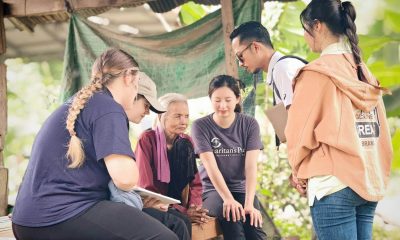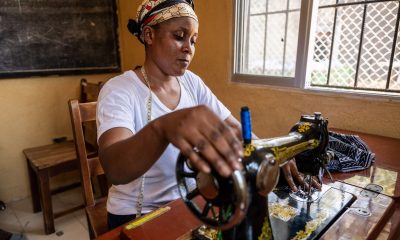Samaritan’s Purse is training church and community leaders to be effective in times of crisis
When Tanneh Fayieh’s granddaughter died, her community said that Tanneh had killed her. They believed Tanneh was a witch. Although Ebola Virus Disease had been in Liberia for several months, many people didn’t believe the virus was real. But as it quickly infected entire communities, it became hard to deny.
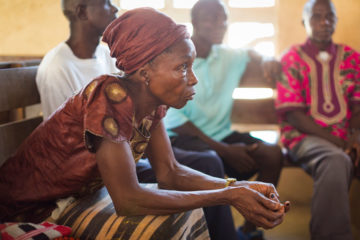
Tanneh’s son and granddaughter died from Ebola.
Tanneh was forced into a 21-day isolation period to ensure that she didn’t also have the virus. During that time, she was cut off from her community and family and couldn’t even fetch water for herself. When she emerged from isolation, she found out that her son had also died from the disease. Before she had time to grieve, she came into contact with someone else who had Ebola and was forced into isolation again.
“At the beginning, people denied, and people couldn’t believe that Ebola was real,” Tanneh said. “But later, when people realized [Ebola was real] and they got involved in hand washing, we started experiencing the calming down of the Ebola spreading from one person to another.”
Liberia was first declared Ebola-free in May 2015, 14 months after the first infection was reported. Although the virus had mostly left the country, many people weren’t able to return to their normal lives. They were scarred from the events of the past year.
Leadership Development and Trauma Counseling
Samaritan’s Purse began working with Ebola survivors in Liberia in several capacities—through clinics, vocational training, support groups, and other programs. One of these programs is called Leadership Development and Trauma Counseling. One reason Ebola spread in rural communities was because of the lack of leadership. Along with counseling those who experienced suffering and loss, the program aims to develop leadership capacity in rural communities.
In Lofa County in northern Liberia, Samaritan’s Purse targeted community and church leaders for these leadership classes. Three components comprise the classes. First, at each meeting, Samaritan’s Purse staff members share the Word of God before beginning the class. These passages often encourage and counsel the leaders. Some, like Tukor Kpanjah, who is a trained traditional midwife in her community, can’t read, so she relies on the Samaritan’s Purse staff members to share God’s Word with her.
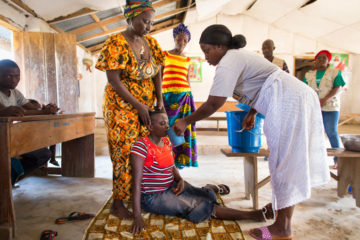
Tukor (orange dress) performs a skit during class. The women are showing how to care for someone who is sick.
“The Word of God that I’ve been hearing is really touching me,” Tukor said. “When you have faith in God, everything is possible. They also encourage us to have love among ourselves.”
The second component of the classes is correct health information, such as how to use dish racks, how to wash fruit before eating it, and when to take children to the local health clinic. Ebola spread rapidly in rural communities because many people didn’t practice good hygiene. These classes aim to prevent further disease.
The third component of the class is leadership and livelihood training, which helps community leaders, church leaders, local midwives, and other leaders to know how to communicate with their communities. The hope is that if another crisis like Ebola hits Liberia again, these leaders will be able to share correct information, which will slow the spread of the disease.
Changing Communities
Samaritan’s Purse is already seeing change in the communities where leaders are being trained. Tanneh, who is a women’s leader in her community, said the classes have encouraged her to lead a community cleanup day. She has also been encouraging her sick neighbors to go to the hospital and pregnant mothers to seek prenatal treatment.
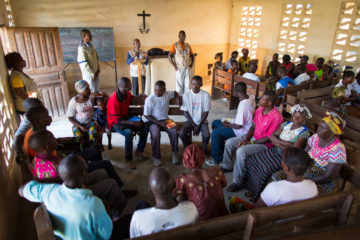
Leadership development classes in rural areas are helping equip community and church leaders.
Tukor said the classes have helped her learn how to better communicate with her clients, and she is now training people in her community on how to properly use mosquito nets to avoid diseases such as malaria.
One church leader, Kpanna Kelley, said that she now communicates with people in the church congregation more than before. She said she’s learned how to better share God’s Word with children in the church. Most importantly, she said her family has noticed that she’s different.
“The Word of God tells us how to love each other, how to have faith in God, how to work as a team, and they tell us Bible stories,” Kpanna said. “I’m thankful to Samaritan’s Purse for this training. I feel like this training was brought for me because it’s really bringing a positive change in my life and the life of my family members.”
Through this program, Samaritan’s Purse plans to train 526 community and church leaders. Please pray that they will be able to bring about changes in their community and that the training will be able to effectively spread the Gospel through these leaders.


